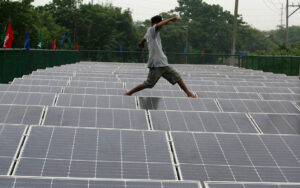Renewables dominate list of ‘significant’ energy projects
RENEWABLE ENERGY projects topped the list of projects classified by the Department of Energy (DoE) as energy projects of national significance (EPNS), granting them expedited permit processing privileges. Between May and December, the DoE issued EPNS certificates to 91 renewable energy projects with a total capacity of 19 gigawatts (GW) and four conventional power plants […]

RENEWABLE ENERGY projects topped the list of projects classified by the Department of Energy (DoE) as energy projects of national significance (EPNS), granting them expedited permit processing privileges.
Between May and December, the DoE issued EPNS certificates to 91 renewable energy projects with a total capacity of 19 gigawatts (GW) and four conventional power plants generating 1.5 GW, it said in a statement on Monday.
The DoE has also granted EPNS status to 29 transmission projects, 24 microgrid system projects, and one exploration project.
Overall, the government is expecting total investment from the certified projects to total P2.4 trillion. Most of these projects are set to be completed in the next two to five years.
Among the large-scale certified projects is the Terra Solar Project developed by Terra Solar Philippines, Inc., an arm of power distributor Manila Electric Co. The project involves a pioneering 3,500-megawatt (MW) solar farm and a 4,500-megawatt-hour battery energy storage system.
Another project on the list is the 1,400-MW Pakil Pumped-Storage Hydroelectric Power Project of Ahunan Power, Inc., a wholly owned unit of Prime Infrastructure Capital, Inc.
The DoE also endorsed the San Miguel Bay Offshore Wind Power Project, which is 100% owned by Danish energy company CI NMF Philippines Corp. It is expected to contribute 1,000 MW of additional power generation capacity.
“The timely development of critical energy infrastructure is essential to securing our nation’s energy future,” Energy Secretary Raphael P.M. Lotilla said.
“By facilitating investment in power generation and transmission in an efficient and timely manner, we are not only strengthening our energy security but also accelerating our transition to a cleaner, more resilient energy system,” he added.
The certification is authorized by Executive Order No. 30 issued in 2017, expediting the issuance of regulatory and documentary requirements from local and national government agencies.
In December 2020, the Energy department halted certifications to “give way to a thorough evaluation of its effectiveness with respect to securing regulatory permits and licenses, endorsements and other requirements relevant to the timely development and completion of energy projects.”
The DoE resumed issuing EPNS certificates in October 2023.
According to revised EPNS guidelines issued in April 2024, major energy projects eligible for certification are those identified in the Philippine Energy Plan, including power generation, transmission, distribution, and ancillary services essential for grid stability and load growth.
Projects which involve a significant capital investment of at least P3.5 billion can also be certified.
The revised framework grants automatic EPNS status to renewable energy projects eligible for the Feed-in Tariff System, those selected through the Green Energy Auction Program, and “projects that support the country’s energy transition goals in line with DoE policies promoting clean energy.”
Certifications remain valid until the project’s commercial operation date.
Citing monitoring reports from project proponents, the DoE said 52 out of 133 commercial-stage projects have obtained all required permits, while four out of 16 pre-development projects have completed their permitting requirements.
The remaining projects are in various stages of permit processing, with 40 yet to obtain any permits. — Sheldeen Joy Talavera
















